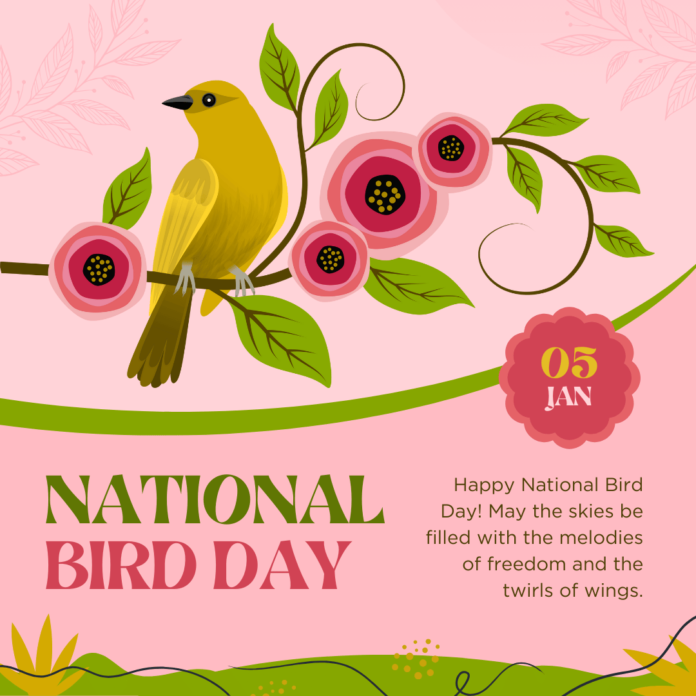Date of National Bird Day 2025
National Bird Day 2025 is celebrated on Sunday, January 5th.
Also Read: National Whipped Cream Day 2025: Date, History, Significance, Activities, Recipes and Fun-facts
Also Read: World Braille Day 2025: Theme, Date, History, Significance, Activities, Challenges and Quotes
Also Read: World Introvert Day 2025: Date, Theme, History, Significance, Activities, Challenges and Quotes
Also Read: Happy New Year Quotes in English 2025
Theme for National Bird Day 2025
The theme for National Bird Day 2025 has not been officially announced yet. Themes for observances like National Bird Day are often released closer to the date or by the organizations responsible for its celebration. However, the theme for National Bird Day 2025 will likely be focuses on raising awareness about bird conservation, the importance of protecting bird habitats, or the role of birds in ecosystems.
History of National Bird Day
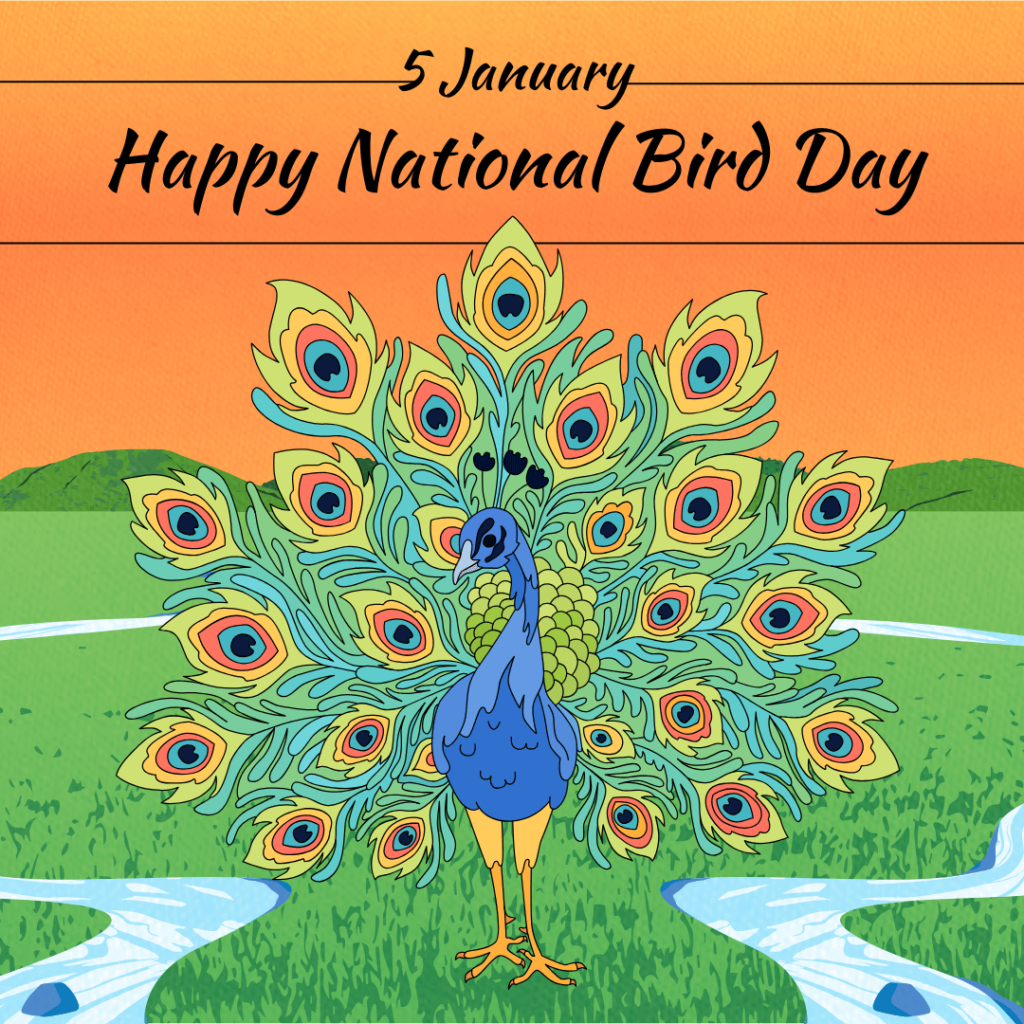
National Bird Day, observed annually on January 5th, was established in 2002 by the Avian Welfare Coalition and Born Free USA.
The day was created to raise awareness about the challenges birds face, both in the wild and in captivity, and to promote their conservation and welfare. By dedicating a day to birds, the founders aimed to inspire individuals to appreciate these creatures in their natural environments and to advocate for their protection.
The initiative encourages activities such as birdwatching, habitat preservation efforts, and educational programs to foster a deeper understanding and respect for avian species.
Significance of National Bird Day
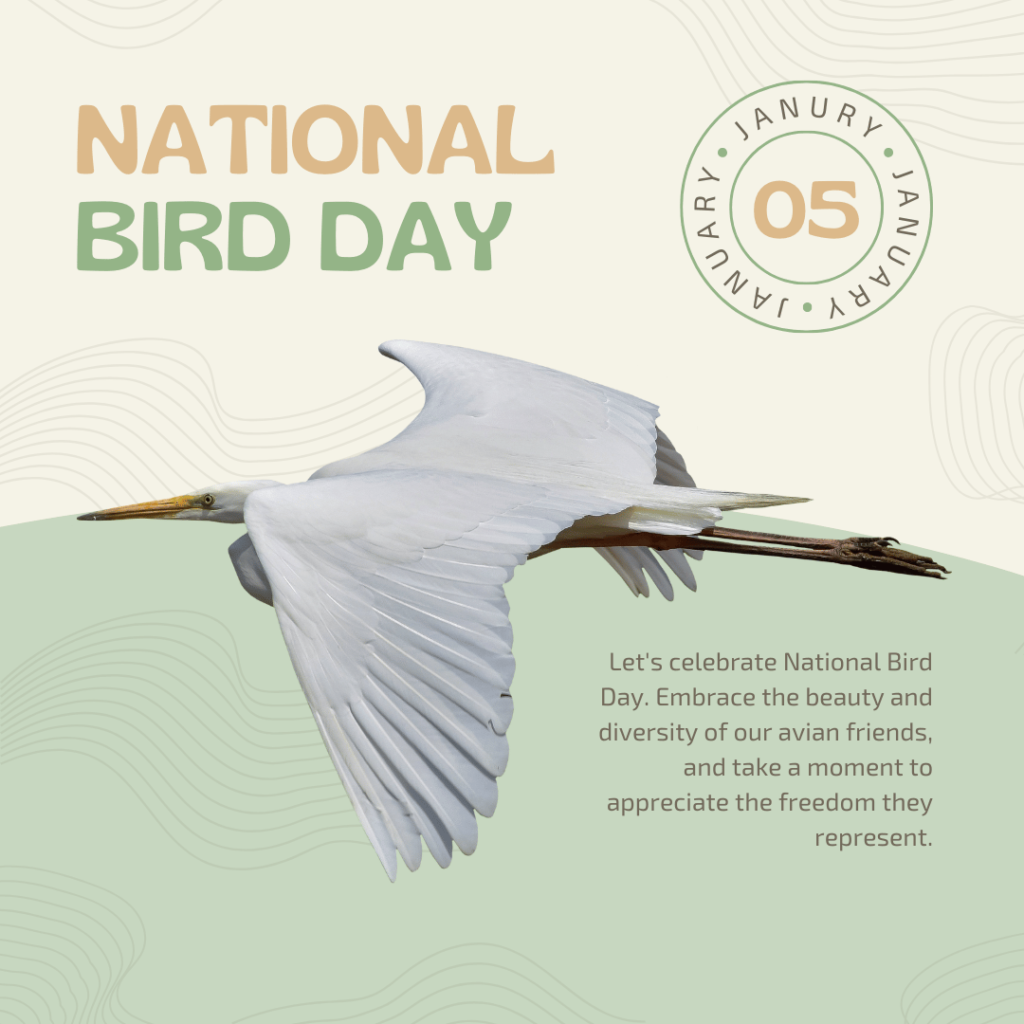
The significance of National Bird Day lies in its focus on raising awareness about the importance of bird conservation and the challenges they face. Here’s why the day matters:
- Promotes Bird Welfare: It highlights the plight of birds kept in captivity and encourages better care for them, emphasizing their need for freedom and natural habitats.
- Conservation Awareness: The day draws attention to declining bird populations due to habitat loss, climate change, pollution, and illegal trade, urging action to protect them.
- Educational Opportunity: National Bird Day serves as a chance to educate people about birds’ roles in ecosystems, such as pest control, seed dispersal, and pollination.
- Encourages Citizen Action: It inspires individuals to participate in bird-friendly activities like birdwatching, planting trees, or supporting conservation efforts.
By celebrating this day, we not only show appreciation for the beauty of birds but also play a part in ensuring their survival for future generations.
7 Activities for National Bird Day 2025
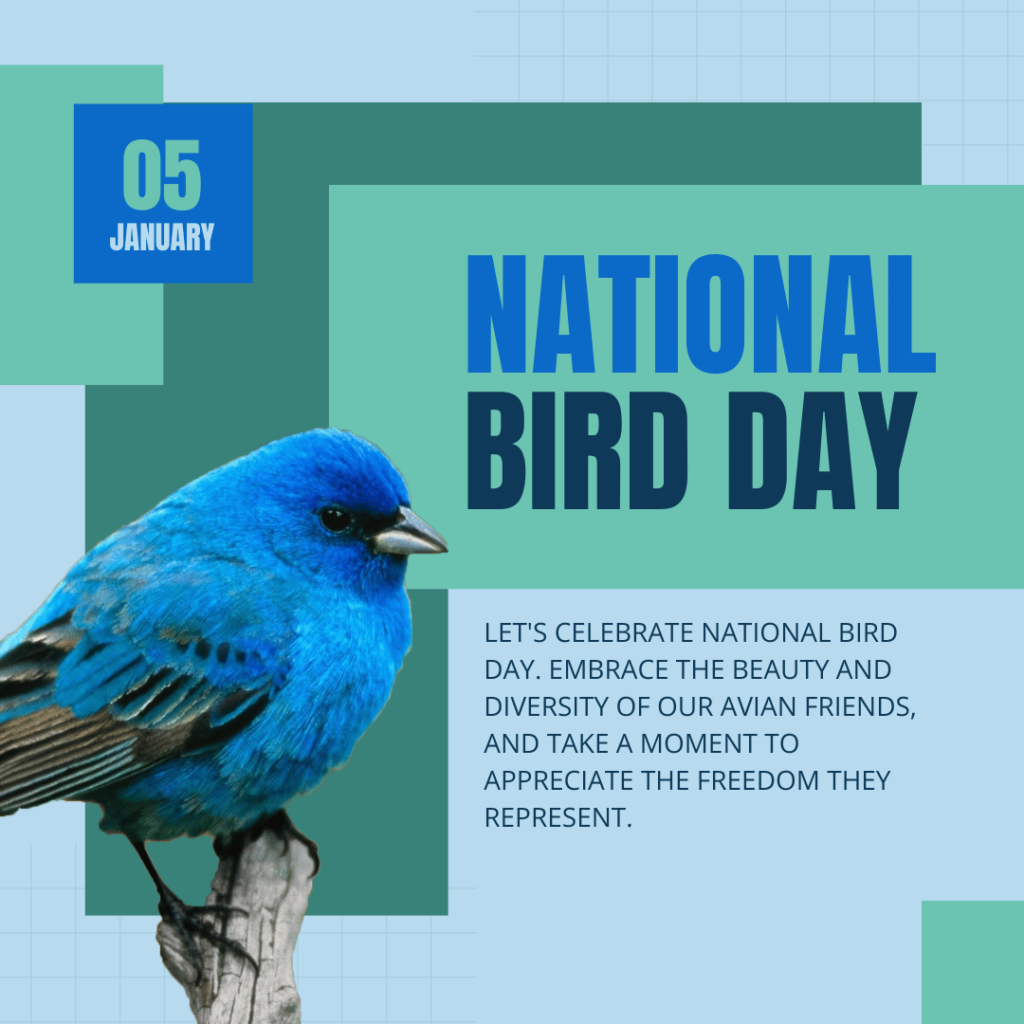
National Bird Day is a great opportunity to engage in fun and meaningful activities that support bird conservation and appreciation. Following are some activities you can participate in:
- Birdwatching: Head to a local park, forest, or wildlife sanctuary and observe different bird species in their natural habitats. Bring binoculars for a closer look!
- Create a Bird-Friendly Environment: Set up bird feeders, baths, or nesting boxes in your garden. Plant native plants that attract birds and provide them with food and shelter.
- Volunteer for Conservation Projects: Join local conservation groups or wildlife organizations that work to protect bird habitats.
- Educational Activities: Learn more about birds by reading books, watching documentaries, or attending bird-related workshops.
- Photography and Art: Capture beautiful photos of birds or create bird-themed artwork to share on social media. This helps raise awareness and appreciation for their beauty.
- Support Bird Sanctuaries and Rescue Centers: Donate to organizations that care for injured or endangered birds. You can also visit these centers to learn more about their work.
- Advocacy and Awareness: Spread the word about the importance of bird conservation by writing articles, sharing posts on social media, or organizing a local event for National Bird Day.
These activities not only help birds but also provide a fulfilling way to connect with nature and contribute to wildlife conservation. 🐦
7 Common threats to bird populations
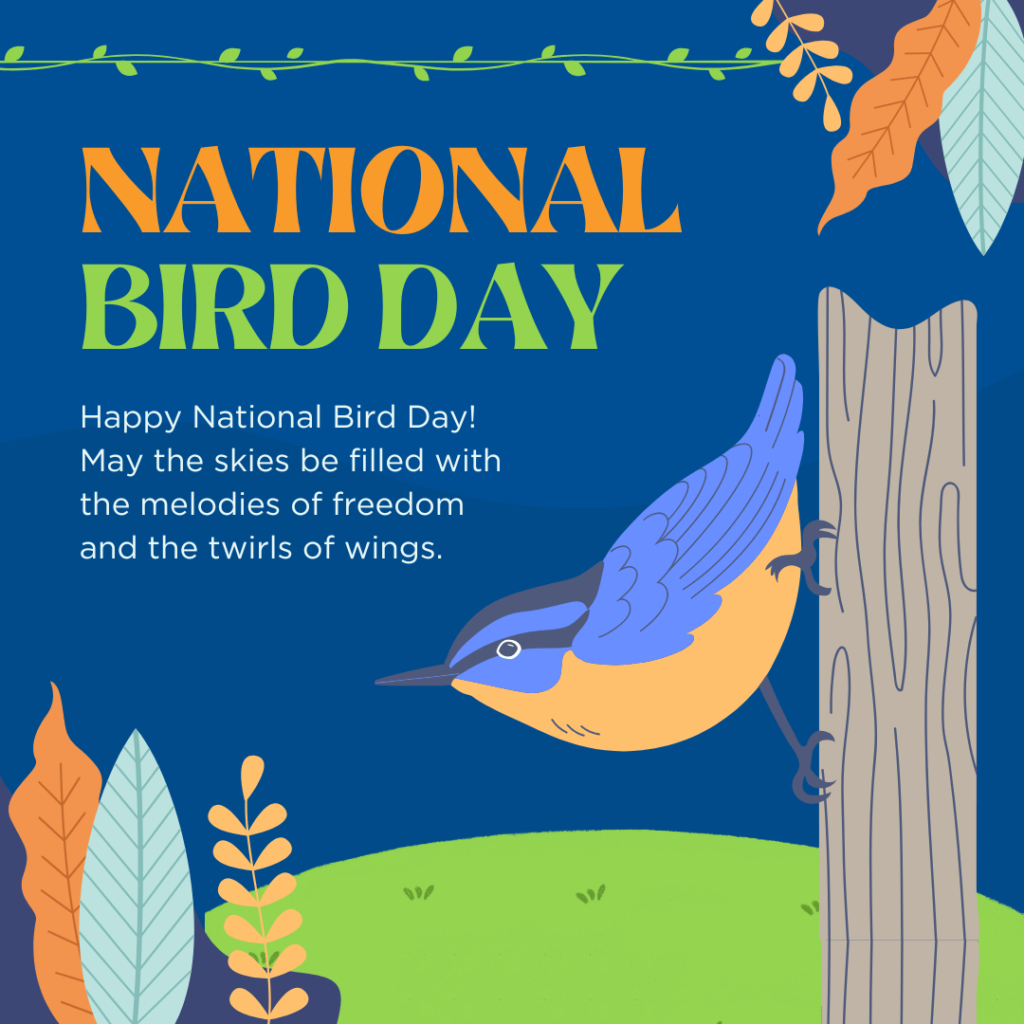
Bird populations face numerous threats that impact their survival and well-being. Following are some of the most common ones:
- Habitat Loss: Deforestation, urbanization, and agricultural expansion destroy natural habitats where birds live, nest, and find food.
- Climate Change: Rising temperatures, changing weather patterns, and extreme events disrupt bird migration, breeding seasons, and food availability.
- Pollution: Plastic waste, chemicals, and oil spills harm birds directly through ingestion or indirectly by contaminating their food and water sources.
- Hunting and Poaching: Illegal hunting and trapping for food, feathers, or the pet trade significantly reduce bird populations, especially of endangered species.
- Collisions with Structures: Tall buildings, wind turbines, and power lines pose a major threat as birds often collide with these structures during flight.
- Pesticides and Herbicides: The use of chemicals in farming reduces insect populations, which are a critical food source for many birds, and can poison the birds directly.
- Overfishing: For seabirds, overfishing depletes their primary food source, making survival harder.
Addressing these threats requires conservation efforts, sustainable practices, and awareness to protect bird populations and ensure their role in healthy ecosystems. 🐦
7 key Climate changes affect bird migration patterns
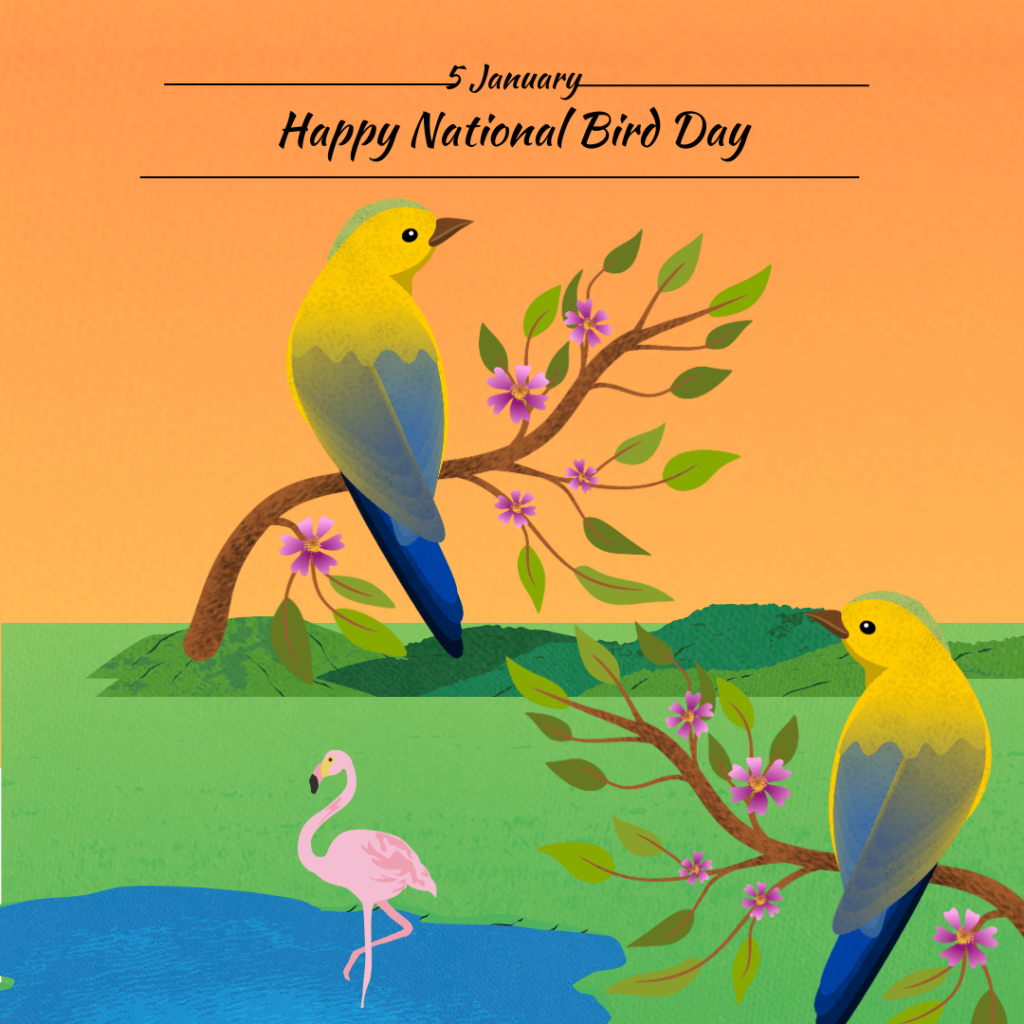
Climate change significantly disrupts bird migration patterns by altering the environmental conditions birds depend on. Here’s how it impacts them:
- Shifts in Migration Timing: Rising temperatures can cause birds to migrate earlier in the spring or later in the fall. This mismatch may lead them to arrive before food sources, such as insects or flowering plants, are available.
- Changes in Migration Routes: As habitats and climates shift, birds are forced to adapt their traditional migration routes. This can lead to longer journeys, increased energy use, and exposure to unfamiliar or unsafe environments.
- Loss of Stopover Sites: Birds rely on stopover sites to rest and refuel during migration. Habitat destruction or climate-driven changes can make these areas uninhabitable, reducing survival rates.
- Food Scarcity: Climate change affects the availability of food along migration paths. For example, droughts or altered seasons can limit the abundance of seeds, insects, and other food sources.
- Increased Weather Hazards: Extreme weather events like storms, heatwaves, or cold snaps can disrupt migration, causing birds to delay or abandon their journeys.
- Mismatched Breeding Seasons: Migratory birds often time their arrivals with breeding seasons. Climate shifts can misalign migration schedules with ideal conditions for nesting and raising chicks.
- Rising Sea Levels: For coastal or seabird species, rising sea levels can destroy critical habitats like marshes and estuaries, forcing them to find alternative routes or stopovers.
Addressing climate change through conservation efforts and sustainable practices is essential to protect migratory birds and their ecosystems. 🐦
8 Effective ways to advocate for Bird Protection Policies
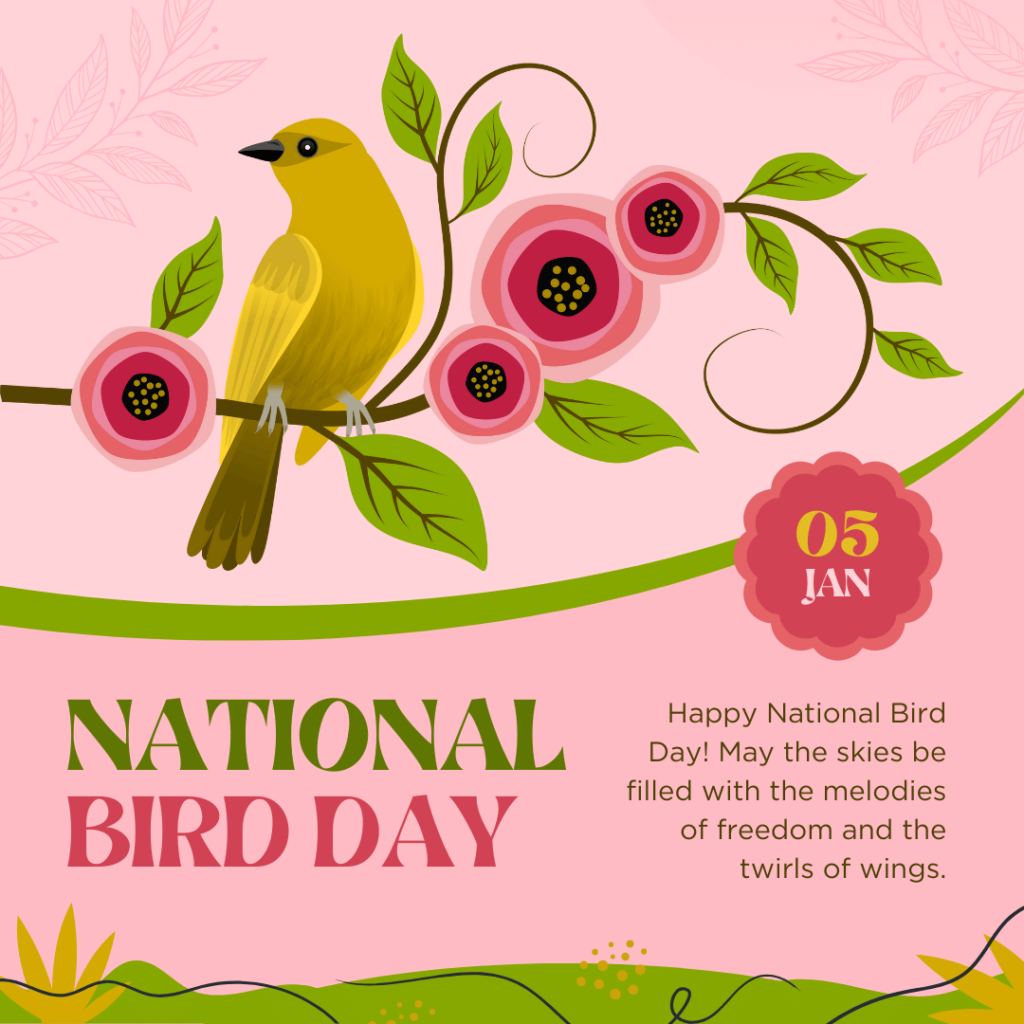
Advocating for bird protection policies is a meaningful way to contribute to bird conservation. Following are some effective ways to get involved:
- Support Conservation Organizations: Collaborate with groups like the Audubon Society, BirdLife International, or local wildlife organizations. These groups often lead policy campaigns and conservation initiatives.
- Raise Awareness: Educate others about the threats birds face and the importance of protective policies. Use social media, blogs, or community events to spread the word.
- Engage with Policymakers: Write letters, send emails, or meet with government officials to advocate for stronger laws protecting bird habitats and addressing threats like poaching, pollution, and climate change.
- Promote Habitat Preservation: Advocate for the protection and restoration of forests, wetlands, and other habitats. Support urban planning initiatives that consider wildlife corridors and green spaces.
- Lobby for Sustainable Practices: Encourage policies that limit pesticide use, promote renewable energy with bird-safe designs, and reduce deforestation.
- Fight Against Illegal Trade: Support initiatives aimed at curbing the illegal trade of birds and enforcing stricter penalties for poaching and trafficking.
- Organize or Join Petitions: Sign and share petitions urging governments to adopt or enforce bird-friendly policies. Platforms like Change.org or local conservation groups often host campaigns.
- Advocate for Climate Action: Push for policies addressing climate change, as it directly impacts bird habitats and migration patterns.
By taking these steps, you can help influence policies that protect birds and ensure their survival for generations to come. 🐦
Best Quotes for National Birds Day 2025
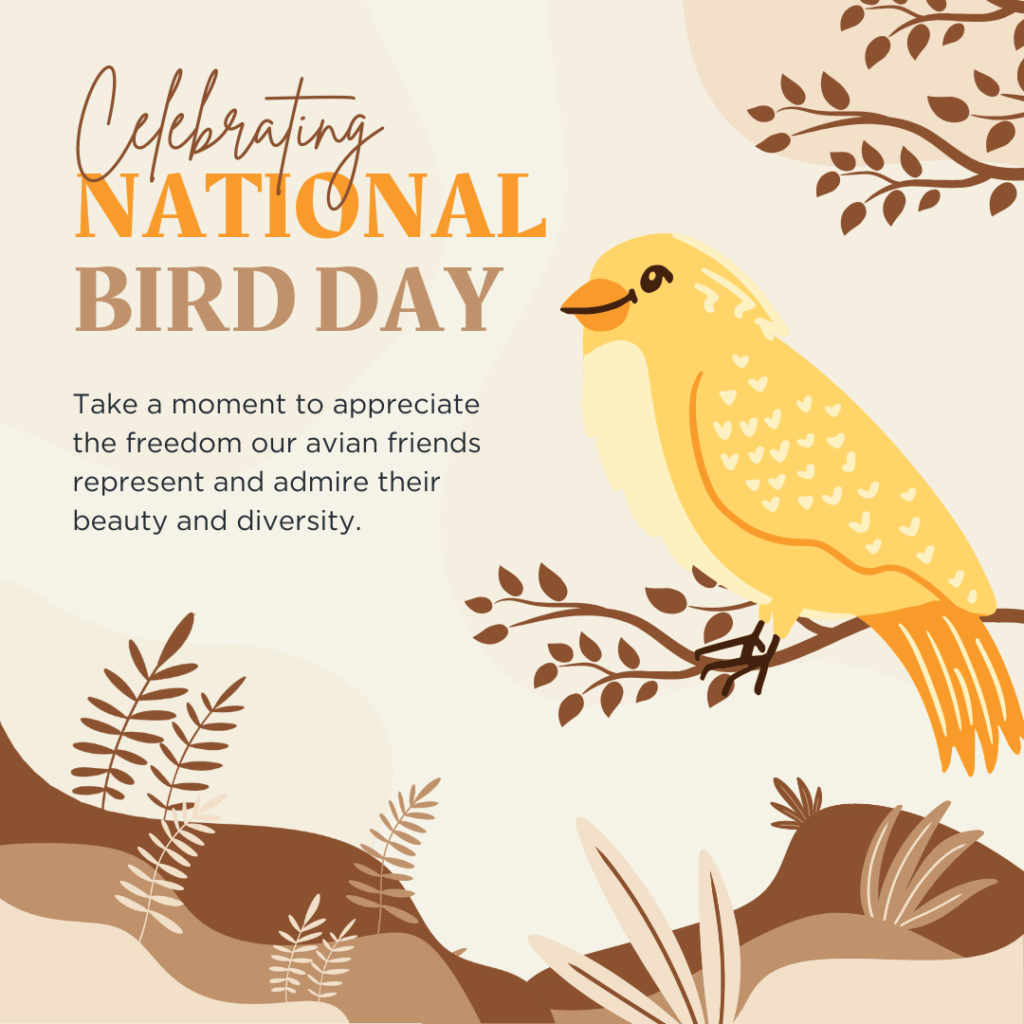
Following are the best inspiring quotes for National Bird Day 2025 with emojis for a vibrant and engaging message:
- “Birds remind us of the beauty of freedom—freedom to roam, to soar, and to be wild. 🌳✨”
- “Birds are the messengers of nature, reminding us of the interconnectedness of all living things. 🌍🕊️”
- “On National Bird Day, let’s celebrate the joy that birds bring into our lives and the importance of protecting their habitats. 🕊️💚”
- “Birds are poetry in motion—silent, graceful, and endlessly captivating. ✨🦜”
- “May the songs of birds inspire us to live more simply and sustainably, harmonizing with nature. 🌱🎶”
- “National Bird Day reminds us that every bird has a song, and every song has a story. 🕊️💫”
- “Birds teach us to embrace change, to migrate with purpose, and to find beauty in every new day. 🕊️🌞”
- “As we observe National Bird Day, let’s not forget that our actions today will determine the future of these winged wonders. 🌍🕊️”
- “Birds are a symbol of hope, resilience, and freedom. Let’s work together to protect their worlds. 🌿🕊️”
- “On National Bird Day, let’s listen to the whispers of the wind and the melodies of our feathered friends, and promise to be better caretakers of the earth. 🌳🕊️💚”
These quotes capture the beauty and importance of birds, encouraging us to cherish and protect them. 🐦
Frequently Asked Questions (FAQ’s) on National Bird Day 2025
Q: When is National Bird Day celebrated?
A: National Bird Day is celebrated every year on January 5th. It’s a special day to appreciate the beauty of birds and raise awareness about protecting them.
Q: Why is National Bird Day celebrated?
A: National Bird Day is celebrated to raise awareness about the importance of bird conservation and to highlight the challenges birds face in today’s world. The observance aims to educate people about the threats posed by habitat loss, climate change, pollution, and illegal wildlife trade.
Q: How did National Bird Day originate?
A: National Bird Day was created by the Avian Welfare Coalition and Born Free USA to promote awareness about birds, particularly those in captivity or endangered due to habitat loss.
Q: Which organizations are associated with National Bird Day?
A: Organizations like the Avian Welfare Coalition, Born Free USA, and various local bird conservation groups work together to support bird welfare on this day.
Q: What activities can I participate in on National Bird Day?
A: You can go birdwatching, learn about local bird species, donate to bird conservation charities, or even plant native trees to create a bird-friendly environment.
Q: How can I help in bird conservation efforts?
A: You can help by reducing plastic use, supporting bird sanctuaries, installing bird feeders or baths, and spreading awareness about the challenges birds face.
Q: Why is bird conservation important?
A: Birds play a vital role in ecosystems. They help control pests, pollinate plants, and spread seeds. Conserving them ensures a healthy balance in nature.
Q: What are some common threats to bird populations?
A: Birds face threats like habitat destruction, climate change, pollution, hunting, and collisions with buildings or wind turbines.
Q: Are there any local events for National Bird Day in my area?
A: Many communities host birdwatching events, educational talks, and conservation activities. Check local conservation groups or parks for events near you.
Q: What are the most endangered bird species in my region?
A: Check the International Union for Conservation of Nature (IUCN) Red List or local wildlife organizations to find out which birds in your region are endangered.

